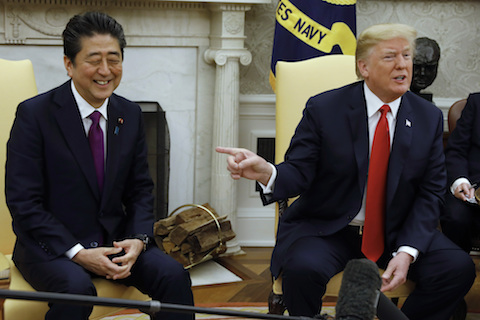U.S. President Donald Trump said he may announce something on a U.S.-Japan trade agreement in August, giving Prime Minister Shinzo Abe breathing space on the contentious issue as his ruling party heads into elections planned for July.

Trump has threatened to raise tariffs on the approximately $50 billion worth of Japanese cars and auto parts exported to the U.S. annually, and is seeking greater access to the world’s third-largest economy for American farmers. Before formal discussions with Abe in Tokyo on Monday, Trump said told reporters that “a lot of very positive things are happening on trade.
Trump arrived at the Imperial Palace on Monday and became the first foreign head of state to meet new Emperor Naruhito, who ascended the Chrysanthemum throne on May 1. The two shook hands and were greeted by an honor guard, a red-carpet and an assembly of dignitaries on palace grounds. Trump and Abe are expected to hold a joint news conference at about 2 p.m. Tokyo time after their talks and a working lunch.
Japan is seeking to stay in Trump’s good graces in order to avoid costly tariffs and retain positive relations with an ally that ensures its security against the likes of China and North Korea. Trump on Monday also expressed support for Abe playing a role in facilitating talks with Iran as tensions rise in the Middle East.
“I am happy to be able to show to the nation and the world that ties between Japan and the U.S. are strong,” Abe said ahead of his meeting with Trump.
On trade, the two countries still have differences and agreed “to work to get a deal done quickly,” Japan Economy Minister Toshimitsu Motegi said Saturday after almost three hours of discussions with U.S. Trade Representative Robert Lighthizer in Tokyo. They didn’t discuss contentious issues such as U.S. threats to restrict Japanese car exports and applying a currency clause, Motegi said.
Japan will hold elections for the upper house in July, and many have predicted the government will take the opportunity to dissolve the more powerful lower house at the same time. It will be politically difficult for Abe to concede anything, particularly on agriculture, ahead of the vote.
The two sides didn’t discuss contentious issues such as U.S. threats to restrict Japanese car exports and applying a currency clause, Motegi said. “We agreed to work to get a deal done quickly.”
Security Threat
Trump last week declared that imported cars represented a threat to U.S. national security but announced a six-month delay in imposing tariffs on imported vehicles and parts from Japan and other nations in order to to pursue negotiations. Trump, who arrived in Tokyo on Saturday, has sought to cut the U.S. trade deficit with Japan.
At a dinner with Japanese business leaders Saturday, Trump sought out one who had recently criticized the U.S. leader.
Akio Toyoda, president of Toyota Motor Corp., was among Japan’s top executives who met Trump soon after he arrived in Japan for his four-day visit. Earlier this month, Toyoda rebuked Trump’s declaration that imported cars and components threaten U.S. national security, saying it sent a message to Toyota that its decades of investments in the U.S. aren’t welcomed.










